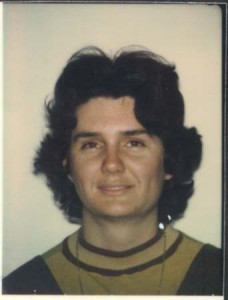
Historical Society, MSP 3800
Teresa was my cousin. I came to live with her in the early 60’s. My parents had divorced and I was having a hard time coping with it. I was getting into a lot of trouble and my Mom decided that I could use a man’s influence, so she sent me to live with her sister and her husband. I left Fort Benning, Georgia in the end of November 1963. Kennedy had just been assassinated and the country was in turmoil. On the bus ride across the country I saw a lot of pain and things that really confused me. I was a lost child and I didn’t really understand what the heck was going on.
When I got to Tucson and was met at the bus station by Teresa who was all smiles and put her arm around me, things didn’t seem so bad. My aunt and uncle treated me like one of their own and I started school. Teresa took me under her wing and we always talked about things. Hippies, the Beatles, we talked about what was going on in the world. I really think that at this point of time in my life I could have gone in several different directions. Teresa helped choose the best options. Teresa was in high school at this time and she took me to football games and exposed me to things that I never would have done if it wasn’t for her. High school plays, movies, all sorts of things.
Looking back I can see that Teresa was really affected by events of the times. I remember one night we were watching TV and the news was showing Vietnam and the civil rights riots in Mississippi. Seeing policemen turning fire hoses on kids and helpless old ladies really affected her. She was always so melancholy after watching soldiers being put on helicopters knowing that she had friends her age that were dying in a far off place that many people didn’t even know about. Being an army brat, I could understand those things, but I looked at them differently because I always thought they were dying for their country. Teresa and I had many an argument on this. I don’t think we ever agreed, but she would hug me and say that sometime, somewhere I would understand what she was feeling. She was right.
I lived with her for several more years and finally went back to live with my Dad. I lost touch with Teresa for many years and didn’t really know what she was up to. I found out that she had moved to San Francisco to the Haight-Ashbury district and had become the hippie I always knew that she would become. I could see her helping with the free clinic and finding food for the poor. That was Teresa. I went to college played football and became a high school coach. I know that some of the things that Teresa had taught me – compassion, trust and humanity – helped me with my teaching and coaching.
Sometime in early 1978 January or February, I am not really sure of the time, I got a call from Teresa. She had found out that I had become a coach and a teacher, and she was looking for books and educational material for the church. We talked and I really felt something was wrong. She seemed happy, but there was something in her voice that I could not put a finger on. She was saying things that I couldn’t quite figure out – that the church had been forced to move out of the country and start anew. I promised that I would try and find some things that the school was not going to use and send them to her. I sent some, but they came back because the church had changed addresses and the postal service wouldn’t forward it because of the added cost.
Then I saw the news – the pictures of all the bodies. The tubs of poisoned lemonade, the syringes. I was in shock. I kept looking for her body – something, anything – that would tell me she was not dead. My uncle sent me the news paper clipping and I remember thinking, “How could Teresa do this?” So many questions left unanswered.
I choose to remember her as the happy-go-lucky high school girl who worried about boys, homecoming and the senior prom. But I know she was so much more. I miss her and wish we could talk today. It seems the sixties had taken another soul and, as the song said, “only the good die young.”
(James McNiel may be reach at james.mcniel@att.net.)